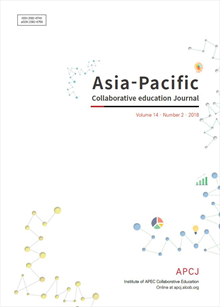간행물
Asia-Pacific Collaborative education Journal

- 발행기관 APEC국제교육협력원
- 자료유형 학술지
- 간기 반년간
- ISSN 2092-674X (Print)2092-6758 (Online)
- 수록기간 2004 ~ 2021
- 주제분류 사회과학 > 교육학 사회과학 분류의 다른 간행물
- 십진분류KDC 371DDC 379
권호리스트/논문검색
Volume 17 Number 2 (2021년 12월) 2건
1.
2021.12
구독 인증기관 무료, 개인회원 유료
This study aims to examine the challenges facing Tanzania's primary education in achieving quality education and make comparisons with other countries. This study employed secondary data analysis procedures. The documents reviewed were published from January 2002 to October 2021. Firstly, the documents comprised the government's plans and policies, as well as non-governmental and multilateral organizations’ reports. Secondly, empirical studies, namely scholarly journals, reviewed articles, reference books, and theses, were reviewed. As a result of searches conducted by Google Scholar, Taylor and Francis, Sage Publication, and Science Direct, a total of 50 documents were retrieved and considered for content analysis. The findings showed that despite the noticeable achievements, the learning quality and outcomes remain daunting in Tanzanian primary schools. Explicitly, the pupil-classroom ratio (PCR) is very high due to a shortage of school buildings to accommodate the rapid increase in enrollment of pupils necessitated by the Free Primary Education (FPE) policy. The textbook-pupil ratio (TPR) and pupil-teacher ratio (PTR) are high and do not match the desirable demands. Teachers have doubtful quality since there are low entrance qualifications for the colleges and they receive little or no in-service training. Also, teachers’ absenteeism from duty is overwhelming. The budget allocation and expenditure on education have been inadequate, resulting in a shortage of necessary school infrastructure, including classrooms and libraries. Moreover, the curriculum lacks relevance to the Tanzania context, and its development process is not inclusive of stakeholders. The academic performance of pupils in school tests and national examinations is not impressive and consistent. Similar challenges face Uganda, Rwanda, and Kenya, which are considered case studies of developing countries, specifically in Sub-Saharan Africa. Developed countries such as the United States, the United Kingdom, and South Korea, on the other hand, experience language barriers in multicultural societies, technological bullying, classroom breakdowns, a lack of parental cooperation, and academic pressure and anxiety. This study recommended policymakers in Tanzania and Sub-Saharan Africa at large should critically rethink their educational plans, policies, and programs so that they can adopt the best approaches and strategies for providing quality primary education. This could involve more investment in education, researching on alternative education, and trying to embrace the out-of-school programs that continue to receive considerable attention in academic discussions
5,500원
2.
2021.12
구독 인증기관 무료, 개인회원 유료
The 17th APEC Future Education Forum (AFEF) and the 19th International ALCoB Conference were held from 28 September (Tuesday) to 1 October (Friday) in a virtual manner. The annual forum and conference serve as an invaluable opportunity to discuss future directions of education and human resources development in the Asia-Pacific region. Since 2005, the forum and conference have served their role as the largest and longest thematic meeting in the APEC Human Resources Development Working Group (HRDWG). The 2021 forum and conference have gathered 780 participants from 20 APEC member economies, guest economies and international institutions. Under the theme “Strengthening lifelong competencies and skills development for individuals’ career, education, training, and life cycles”, the forum and conference reflected the current educational agenda from 21 APEC member economies and other international organizations such as G20, UNESCO. As a way forward, the forum and conference speakers recommend APEC to 1) consider individual and industrial needs for curriculum development, 2) expand lifelong learning policies and practices at both domestic and international level and 3) develop a public-private partnership to prepare its future talents with adequate competencies. This review explains the 17th AFEF and the 19th International ALCoB Conference background, summary and outcomes. The review also briefs on collective actions member economies can take as future steps to continue the forum and conference discussions.
4,000원

